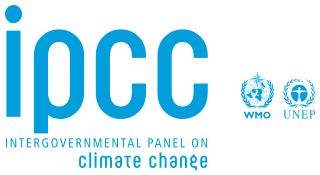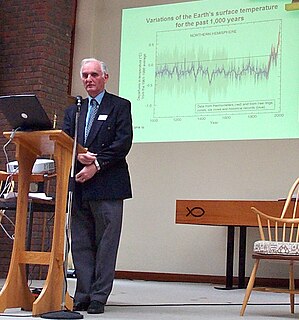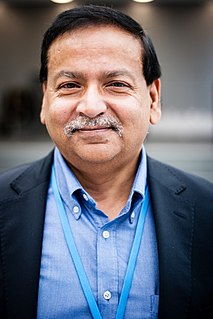Related Research Articles

The Intergovernmental Panel on Climate Change (IPCC) is an intergovernmental body of the United Nations responsible for advancing knowledge on human-induced climate change. It was established in 1988 by the World Meteorological Organization (WMO) and the United Nations Environment Programme (UNEP), and later endorsed by United Nations General Assembly. It is headquartered in Geneva, Switzerland, and is composed of 195 member states. The IPCC is governed by its member states, which elect a bureau of scientists to serve for the duration of an assessment cycle ; the bureau selects experts nominated by governments and observer organisations to prepare IPCC reports. The IPCC is supported by a secretariat and various "Technical Support Units" from specialised working groups and task forces.
John William Zillman AO is an Australian meteorologist, and former President of the World Meteorological Organization and the Australian Academy of Technological Sciences and Engineering (ATSE). He was born and was educated in Brisbane, Queensland. Through his leadership in professional organizations and advisory groups, Zillman has contributed to shaping science and innovation policy in Australia. More widely, he has contributed to raising awareness to the consequences of global climate change through involvement in the Intergovernmental Panel on Climate Change (IPCC).
The Summary for policymakers (SPM) is a summary of the Intergovernmental Panel on Climate Change (IPCC) reports intended to aid policymakers. The form is approved line by line by governments: "Negotiations occur over wording to ensure accuracy, balance, clarity of message, and relevance to understanding and policy."

The IPCC Third Assessment Report (TAR), Climate Change 2001, is an assessment of available scientific and socio-economic information on climate change by the IPCC. The Third Assessment Report is the third of a series of assessments. Statements of the IPCC or information from the TAR are often used as a reference showing a scientific consensus on the subject of global warming, although a small minority of scientists take issue with the UN assessments. The Third Assessment Report (TAR) was completed in 2001 and consists of four reports, three of them from its Working Groups: Working Group I: The Scientific Basis; Working Group II: Impacts, Adaptation and Vulnerability; Working Group III: Mitigation; Synthesis Report. A number of the TAR's conclusions are given quantitative estimates of how probable it is that they are correct, e.g., greater than 66% probability of being correct. These are "Bayesian" probabilities, which are based on an expert assessment of all the available evidence.

The Second Assessment Report (SAR) of the Intergovernmental Panel on Climate Change (IPCC), published in 1995, is an assessment of the then available scientific and socio-economic information on climate change. The report was split into four parts: a synthesis to help interpret UNFCCC article 2, The Science of Climate Change, Impacts, Adaptations and Mitigation of Climate Change, Economic and Social Dimensions of Climate Change. Each of the last three parts was completed by a separate Working Group (WG), and each has a Summary for Policymakers (SPM) that represents a consensus of national representatives.

The effects of climate change span the impacts on physical environment, ecosystems and human societies due to human-caused climate change. The future impact of climate change depends on how much nations reduce greenhouse gas emissions and adapt to climate change. Effects that scientists predicted in the past—loss of sea ice, accelerated sea level rise and longer, more intense heat waves—are now occurring. The changes in climate are not uniform across the Earth. In particular, land areas change more quickly than oceans. The regional changes vary: at high latitudes it is the average temperature that is increasing, while for the oceans and tropics it is in particular the rainfall and the water cycle where changes are observed. Global warming changes regional climate via the melting of ice, changes in the hydrological cycle and changing currents in the oceans.

The economics of climate change concerns the economic aspects of climate change; this can inform policies that governments might consider in response. A number of factors make this and the politics of climate change a difficult problem: it is a long-term, intergenerational problem; benefits and costs are distributed unequally both within and across countries; and both the scientific consensus and public opinion on climate change need to be taken into account.

The IPCC Fourth Assessment Report (AR4) is a report on climate change created with the help of a large number of contributors, both scientists and governmental representatives. There has been considerable political controversy over a small number of errors found in the report, and there have been calls for review of the process used to formulate the report. The overwhelming majority view of scientists with expertise in climate change is that errors, when found, are corrected, and the issues as identified do not undermine the conclusions of the report that the climate system is warming in response to increased levels of greenhouse gases, largely due to human activities.

Roger S. Pulwarty is a scientist from Trinidad and Tobago and contributed to the work of the Intergovernmental Panel on Climate Change (IPCC). Pulwarty is the Senior Scientist in the National Oceanic and Atmospheric Administration (NOAA) Physical Sciences Laboratory in Boulder, Colorado.

The Fifth Assessment Report (AR5) of the United Nations Intergovernmental Panel on Climate Change (IPCC) is the fifth in a series of such reports and was completed in 2014. As had been the case in the past, the outline of the AR5 was developed through a scoping process which involved climate change experts from all relevant disciplines and users of IPCC reports, in particular representatives from governments. Governments and organizations involved in the Fourth Report were asked to submit comments and observations in writing with the submissions analysed by the panel. AR5 followed the same general format as of AR4, with three Working Group reports and a Synthesis report. The report was delivered in stages, starting with the report from Working Group I in September 2013 which reported on the physical science basis, based on 9,200 peer-reviewed studies. Projections in AR5 are based on "Representative Concentration Pathways" (RCPs). The RCPs are consistent with a wide range of possible changes in future anthropogenic greenhouse gas emissions. Projected changes in global mean surface temperature and sea level are given in the main RCP article. The Synthesis Report was released on 2 November 2014, in time to pave the way for negotiations on reducing carbon emissions at the UN Climate Change Conference in Paris during late 2015.

Saleemul Huq is a Bangladeshi-British scientist and has been the Director of the International Centre for Climate Change & Development (ICCCAD) based in Bangladesh, also Professor at Independent University, Bangladesh (IUB).

David Stuart Wratt is a New Zealand climate scientist who specialises in meteorology and the science and impact of climate change. He is an adjunct research fellow at the New Zealand Climate Change Research Institute at Victoria University of Wellington, and has had many roles at the National Institute of Water and Atmospheric Research (NIWA), including six years as chief scientist (climate). His current position at NIWA is emeritus scientist (climate). Wratt is a Companion of the Royal Society of New Zealand and was the chair of the society's New Zealand Climate Committee. He has had advisory roles for the New Zealand Government, including science advisor at the Ministry for the Environment, and is currently a member of the Science Board for the Ministry of Business, Innovation and Employment. He has had input into assessments by the Intergovernmental Panel on Climate Change (IPCC), notably, contributing to its award of the 2007 Nobel Peace Prize through his contributions to the IPCC Fourth Assessment Report. Wratt has worked in the United States and Australia as well as New Zealand.
Alan Robock is an American climatologist. He is currently Distinguished Professor in the Department of Environmental Sciences at Rutgers University, New Jersey. He advocates nuclear disarmament and has met with Fidel Castro during a lecture trip to Cuba discuss the dangers of nuclear weapons. Alan Robock was a 2007 IPCC author, a member of the organisation when it was awarded the Nobel Peace Prize, "for their efforts to build up and disseminate greater knowledge about man-made climate change, and to lay the foundations for the measures that are needed to counteract such change".
Julie Michelle Arblaster is an Australian scientist. She is a Professor in the School of Earth, Atmosphere and Environment at Monash University. She was a contributing author on reports for which the Intergovernmental Panel on Climate Change (IPCC) was a co-recipient of the 2007 Nobel Peace Prize. Arblaster was a lead author on Chapter 12 of the IPCC Working Group I contribution to the IPCC Fifth Assessment Report in 2013. She has received the 2014 Anton Hales Medal for research in earth sciences from the Australian Academy of Science, and the 2017 Priestley Medal from the Australian Meteorological and Oceanographic Society. She has been ranked as one of the Top Influential Earth Scientists of 2010-2020, based on citations and discussion of her work.

The contributions of women in climate change have received increasing attention in the early 21st century. Feedback from women and the issues faced by women have been described as "imperative" by the United Nations and "critical" by the Population Reference Bureau. A report by the World Health Organization concluded that incorporating gender-based analysis would "provide more effective climate change mitigation and adaptation."
Panmao Zhai is a Chinese climatologist, Secretary General of the Chinese Meteorological Society, and one of six co-chair of the Intergovernmental Panel on Climate Change working groups.

The Sixth Assessment Report (AR6) of the United Nations (UN) Intergovernmental Panel on Climate Change (IPCC) is the sixth in a series of reports which assess scientific, technical, and socio-economic information concerning climate change. Three Working Groups have been working on the following topics: The Physical Science Basis (WGI); Impacts, Adaptation and Vulnerability (WGII); Mitigation of Climate Change (WGIII). Of these, the first study was published in 2021, the second report February 2022, and the third in April 2022. The final synthesis report is due to be finished by late 2022.

Opha Pauline Dube or Pauline Dube is a Botswanan environmental scientist and Associate Professor in the Department of Environmental Science at the University of Botswana. She co-authored the IPCC's Special Report on Global Warming of 1.5 °C. She is one of fifteen scientists creating the 2023 Global Sustainable Development Report for the United Nations.
Joyce Penner is an atmospheric scientist known for her research on climate change, especially on the impact of aerosols and clouds.

Subimal Ghosh is Institute Chair Professor in the Department of Civil Engineering and Convener of the Interdisciplinary Program in Climate Studies at Indian Institute of Technology Bombay with research interests in hydrology and hydro-climatology. He obtained PhD degree in 2007 from Indian Institute of Science, Bangalore on a thesis titled "Hydrologic Impacts of Climate Change: Uncertainty Modelling", and ME degree in 2004 from the same institute.
References
- 1 2 "Dr Richard Betts". Met Office . Retrieved 22 March 2012.
- 1 2 Hickman, Leo (29 March 2012). "Met Office hosts 'conversations' with climate sceptics". The Guardian . Retrieved 29 March 2012.
- ↑ Forster, P.; V. Ramaswamy; P. Artaxo; T. Berntsen; R. Betts; D.W. Fahey; J. Haywood; J. Lean; D.C. Lowe; G. Myhre; J. Nganga; R. Prinn; G. Raga; M. Schulz; R. Van Dorland (2007), Solomon, S.; Qin, D.; Manning, M.; Chen, Z.; Marquis, M.; Averyt, K.B.; Tignor, M.; Miller, H.L. (eds.), Changes in Atmospheric Constituents and in Radiative Forcing (PDF), Climate Change 2007: The Physical Science Basis. Contribution of Working Group I to the Fourth Assessment Report of the Intergovernmental Panel on Climate Change, Cambridge University Press, ISBN 978-0-521-88009-1
- ↑ IPCC AR4 WG2 (2007), Parry, M.L.; Canziani, O.F.; Palutikof, J.P.; van der Linden, P.J.; Hanson, C.E. (eds.), Climate Change 2007: Impacts, Adaptation and Vulnerability, Contribution of Working Group II to the Fourth Assessment Report of the Intergovernmental Panel on Climate Change, Cambridge University Press, ISBN 978-0-521-88010-7
- ↑ "IPCC Working Group II Contribution to the Fifth Assessment Report: Coordinating Lead Authors, Lead Authors, and Review Editors" (PDF). IPCC . Retrieved 22 March 2012.
- ↑ "International Journal of Global Warming (IJGW): Editors and Members of the Editorial Board" . Retrieved 22 March 2012.
- ↑ "Journal of Environmental Investing: People". Archived from the original on 4 February 2013. Retrieved 22 March 2012.
- ↑ "Earth System Dynamics: Editorial and Advisory Board" . Retrieved 22 March 2012.
- ↑ "Birthday Honours 2019: the Prime Minister's list" (PDF). Retrieved 8 June 2019.
- ↑ Rossiter, Keith (8 June 2019). "Full list of Devon community heroes recognised in Queen's Birthday Honours". DevonLive. Retrieved 8 June 2019.
- ↑ Townsend, Allie (21 March 2012). "The 140 Best Twitter Feeds of 2012". Time Techland. Retrieved 22 March 2012.
- ↑ "Award for outstanding contribution in public outreach and communication". Royal Meteorological Society. 23 June 2020. Retrieved 23 June 2020.